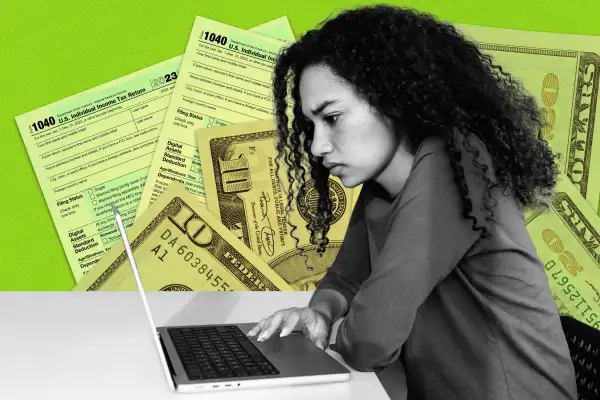Is Preparing Your Taxes Twice a Smart IRS Hack or a Waste of Time?

Doing your taxes can be nerve-wracking, especially if you're unfamiliar with the documents or using an online service. It's easy to spiral into panic: What if your refund is higher than it should be? Could the calculations be wrong? Will the IRS come after you?
For a handful of the 129 million Americans who are set to file their tax returns before the April 15 deadline, the way to calm that anxiety is to prepare their taxes twice — once through, say, TurboTax and once through H&R Block — and compare the results before actually filing with the IRS.
But according to Bill Harris, founder of the fintech Evergreen Money, this isn't necessarily a good idea.
“I don't think it's worth people's time to try to calculate their taxes with two different tax software programs,” he says.
That’s because all major tax preparers generally operate in the same way. They may have distinct advertisements, websites and tools, but at heart they’re identical.
“The IRS code is the IRS code,” says Harris, who ran TurboTax for most of the ‘90s and later served as CEO of PayPal. “Now, it does get subject to interpretation in some ways when you get to very, very complex filings, but for the filings that most of us will do as individuals — and without esoteric investments — it's cut and dried.”
If different tax prep sites produce different tax returns, the most common explanation for the discrepancy is user error. It’s possible to get different results from different tax preparers if, while typing, you enter a number incorrectly. It could also happen if you include a personal detail (like a dependent) or a form (like a 1099-INT) on one website and not the other.
Soon, however, this might be an issue of the past.
Filing taxes directly with the IRS
This year, the IRS is actually testing its own free tax prep tool, called IRS Direct File, in 12 states. The hope is that it’ll eventually roll out to all taxpayers in all states in the future, which could give Nervous Nellies peace of mind that they're doing their taxes correctly because they're preparing them directly with the IRS rather than a third party.
It’s also worth noting that you're likely not at huge risk of the government knocking on your door to yell at you if you make a tax mistake. Although the IRS is spending a big chunk of its controversial Inflation Reduction Act funding on enforcement, the agency has sworn it’s cracking down on wealthy tax dodgers rather than everyday Americans.
In fiscal year 2022, the overall odds of getting audited were 0.38%, according to the Transactional Records Access Clearinghouse. The vast majority of these were correspondence audits, meaning the IRS simply mailed letters to people requesting more information on their taxes (aka you probably don’t need to fret about a surprise visit from an agent with handcuffs).
In fact, Harris says, if you're unhappy with your refund after doing your taxes, it’s smarter to investigate the causes rather than blame the software. Ask yourself: Are you contributing enough to your 401(k)? Do you have a Roth IRA? What’s your investing strategy like?
Harris says this type of tax planning can ultimately save you thousands.
“Don't waste your time chasing a very small amount of money in a very unlikely situation [by doing your taxes twice],” he says. “If you have that kind of time, think about structuring your financial life a little bit more optimally.”
More from Money:
Here's How to Track Your Tax Refund Online
Tax Changes 2024: What's New for Filing Taxes With the IRS This Year?


